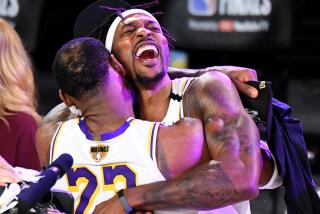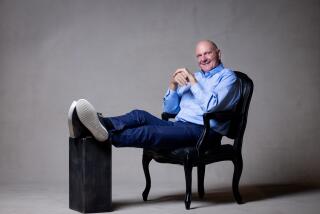Real estate savvy helped seal deal
Word got around that Jack Kent Cooke wanted to cash out.
It was 1977 and the Lakers owner had entered into a divorce that would eventually cost $41 million, a sum worthy of the Guinness World Records for the most costly marital split in history at that time.
His mounting legal bills created an opportunity for an eager buyer named Jerry Buss. The onetime chemist, now wealthy from the real estate boom, wanted to purchase not only the Lakers but also the Forum and the Kings.
Buss had one problem -- he wasn’t the highest bidder.
To secure the deal, he would need to execute a flurry of real estate transactions and three-way swaps. He would also need last-second help from an unlikely ally.
“Jerry was confident that it was going to happen,” his longtime friend and spokesman, Bob Steiner, recalled. “But there was some real excitement.”
In the days since Buss’ death, amid the accolades and remembrances, people might forget he almost lost out on the deal that made him the king of Southern California sports. A deal that made him considerably richer, his $67.5-million investment turning into a sports property now valued by Forbes at $1 billion.
“You have to be lucky and good to make that kind of impact,” said Marc Ganis, a Chicago-based sports business consultant. “And Jerry Buss was both.”
The negotiations with Cooke began informally. Buss periodically flew to Las Vegas -- Cooke’s new home -- where the men talked basketball for hours. Steiner said: “Jerry courted him for more than a year.”
Finally, in the spring of 1979, Cooke grew serious about selling, and he could have found richer buyers. Buss suggested a Monopoly-like land swap that would save on taxes.
“Real estate was his business,” Steiner said. “He knew that field very, very well.”
At first, only the Forum was on the block. Buss certainly had enough Southern California property to offer, but Cooke threw him a curveball: The Canadian entrepreneur wanted the Chrysler Building in New York City.
The Chrysler’s owners did not want any of Buss’ properties, so he had to find buyers to go along with each of his high-rises.
As discussions continued, the deal expanded to include the Lakers and Kings. According to the 1986 book “Winnin’ Times” by former Times sportswriters Scott Ostler and Steve Springer, the Baltimore Orioles and the Watergate complex in Washington were considered as components.
The real crunch occurred in the final hours. Cooke had set a deadline and, with time ticking down, the escrow company informed Buss and his partners they needed more cash.
“They did not want to go to Cooke and say they were $3 million short,” Steiner said. “They had to raise the money.”
Buss’ closest partner, Frank Mariani, quickly arranged a loan from Sam Nassi, future owner of the Indiana Pacers. Another $1 million came from Donald Sterling, who would later buy the Clippers.
In the end, Cooke received the Chrysler Building and other properties. The Chrysler owners got Buss’ high-rises, which they sold to the buyers he had arranged.
As for Buss, he obtained the Forum for $33.5 million, the Lakers for $16 million and the Kings for $8 million. He also got Cooke’s $10-million ranch in California.
“Although timing always matters, there are legions of people that miss the opportunity,” said David Carter, executive director of the USC Sports Business Institute. “So many didn’t realize what Dr. Buss realized.”
The NBA was set to explode. With Magic Johnson and Larry Bird turning pro -- and Michael Jordan soon to follow -- the league quickly grew in popularity.
Buss played a key role, selling basketball as something more than sport, adding the spectacle of fastbreak play, dancing girls and movie stars in the crowd.
Maybe that’s why he pushed so hard for the deal with Cooke, sensing he had a potential gold mine.
“He was a very intuitive guy,” Steiner said. “He really wanted to own the team.”
--
More to Read
Inside the business of entertainment
The Wide Shot brings you news, analysis and insights on everything from streaming wars to production — and what it all means for the future.
You may occasionally receive promotional content from the Los Angeles Times.











